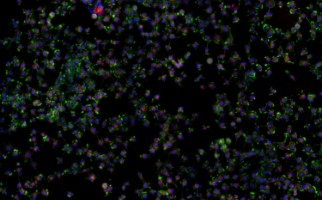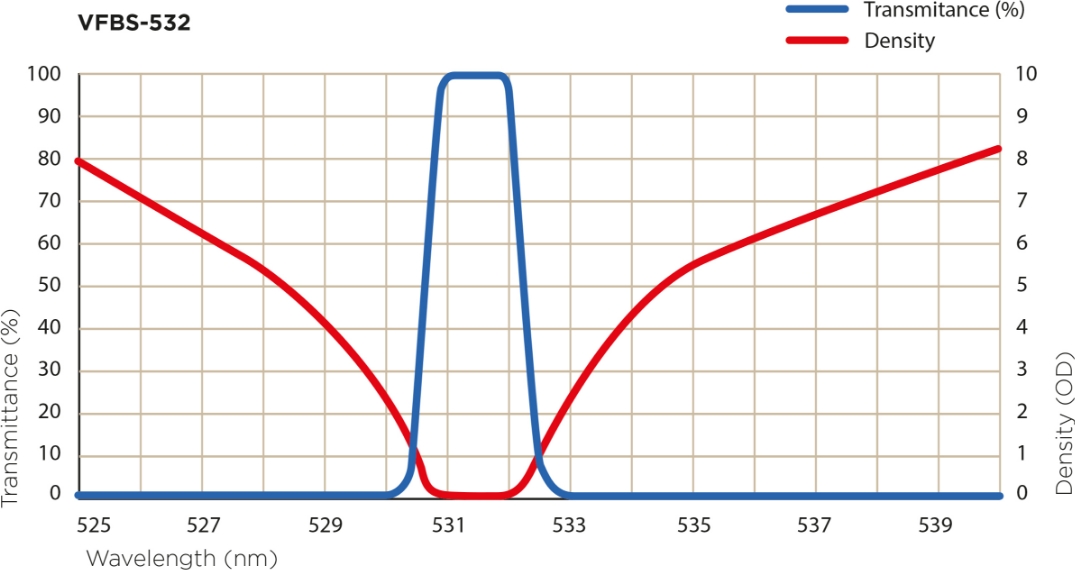Bandpass filter
By designating pass (or transmission) band width and wavelength range to be blocked (or rejected), various spectral characteristics can be obtained.

Application
Designing and manufacturing bandpass filters for various applications.
-

Fluorescence Microscopy
In fluorescence microscopy used for labeling cells and biological tissues, filters are essential for observing specific fluorescence.
-

Multispectral Imaging
Optical filters are utilized in sensors to detect light at specific wavelengths for monitoring atmospheric pollutants and particles.
-

Optical Coherence Tomography (OCT)
In optical sensors used for measurements and examinations within medical devices, filters are necessary to utilize light at specific wavelengths.
-

Raman Spectroscopy
In Raman spectroscopy, used to investigate the composition and structure of chemicals, analysis is conducted using light at specific wavelengths.
-

Flow Cytometry
Devices for testing blood coagulation employ optical filters to use light of specific wavelengths for examination.
In all these applications, the choice of bandpass filter parameters, such as central wavelength and bandwidth, is critical to isolating the desired spectral information.
Properly selected and calibrated bandpass filters help improve image quality, enhance contrast, and provide valuable insights into biological samples, making them essential components of many biomedical imaging systems.
Thanks to our innovative coating technology, steep and inclined transmittance can be achieved with high OD values.


Narrow bandpass filter
We also offer narrow bandpass filters with bandwidths potentially below 10nm. Here are four key characteristics of these filters.
-
Central Wavelength (or Frequency)
A narrow bandpass filter is centred around a specific wavelength. This central wavelength corresponds to the desired spectral range that you want to transmit.
-
Bandwidth
The bandwidth of a narrow bandpass filter is small, making it "narrow" compared to conventional bandpass filter
-
High Transmission
Within its specified bandwidth, a narrow bandpass filter has a high transmission or pass-through rate, meaning it allows a significant portion of the selected wavelengths to pass with minimal attenuation.
-
Steep Roll-off
Outside the specified bandwidth, a narrow bandpass filter exhibits a steep roll-off, meaning it rapidly attenuates or blocks wavelengths that fall outside the desired range. This steep roll-off ensures that unwanted signals and background noise are effectively filtered out.
Angle resistant bandpass filter
Also known as an "angle-insensitive" or "omnidirectional" bandpass filter, is a specialized type of optical filter designed to transmit a specific range of wavelengths or frequencies over a wide range of incident angles.
Unlike standard bandpass filters, which are sensitive to the angle at which light strikes them and may exhibit wavelength shifts or reduced transmission at non-normal angles, angle-resistant bandpass filters maintain their spectral characteristics over a wide range of incident angles.
Some of the characteristic of these filters.
-
Wide Angular Tolerance
Angle-resistant bandpass filters are engineered to work effectively across a broad range of incident angles, typically up to ±45 degrees or more from the normal incidence.
-
Maintained Spectral Performance
These filters maintain their specified spectral characteristics, including central wavelength and bandwidth, even when light or radiation strikes them at various angles.
-
Low Angular Dependence
Angle-resistant bandpass filters have minimized angular dependence, which means that variations in incident angle do not significantly affect the filter's performance.
The design of angle-resistant bandpass filters typically involves complex multilayer coatings that compensate for the angular-dependent interference effects that standard filters may exhibit.
This technology allows for consistent and predictable spectral performance, making these filters particularly useful in applications where maintaining colour accuracy and spectral fidelity is essential across a wide range of angles.
